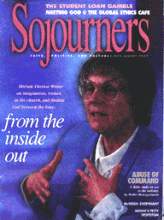Miriam Therese Winter is giving visitors a tour of Hartford Seminary, where she is a professor of liturgy, worship, spirituality, and feminist studies. Outside her office door lies a large, orange stuffed toy lion she salvaged from a dumpster. A toy lamb is sitting on the lions back. She stoops and nestles the lamb between the lions paws, up against its jaw.
"Someone always moves it up on the lions back. I guess they think it looks like the lion is going to eat the lamb. But Isaiah says all natural enemies will lie down together after all. Shouldnt we act as if we believe the unlikely promises of God?" she asks.
What does it mean to live as if? What if we tried to make a reality of the radically liberating message found in the writings of the Hebrew prophets and the gospels? What if we let our sacred metaphors and images be alive? What if we believed God is untameable by our words or worship, uncontrolled by our fear or prejudices? Where would we find ourselves?
Questions such as these have taken Winter, a Catholic woman religious, teacher, author, songwriter, and liturgist to places as far-flung and unexpected as Cambodian refugee camps and the faculty of a Protestant seminary. Such questions have unified for her the work of liturgy and imagination with the work of seeking structural change and serving others. They have led her from acknowledgment of the experience as a woman of oppression and prejudice to the struggle against all injustice.
Where these questions have not taken Winter is away from her Christian faith or out of the church. Meeting other women who, like herself, identify themselves as feminist and Christian intrigued Winter enough to lead her to explore more deeply why and how such women remain in the tradition.
Read the Full Article

